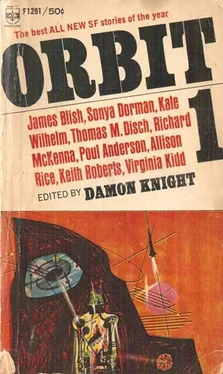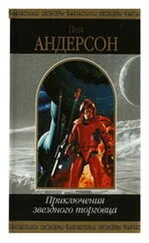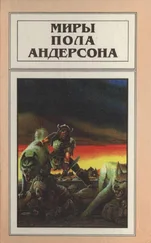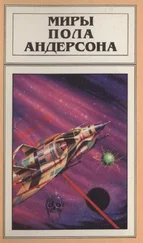Пол Андерсон - Orbit 1
Здесь есть возможность читать онлайн «Пол Андерсон - Orbit 1» весь текст электронной книги совершенно бесплатно (целиком полную версию без сокращений). В некоторых случаях можно слушать аудио, скачать через торрент в формате fb2 и присутствует краткое содержание. Год выпуска: 1966, Жанр: Фантастика и фэнтези, на английском языке. Описание произведения, (предисловие) а так же отзывы посетителей доступны на портале библиотеки ЛибКат.
- Название:Orbit 1
- Автор:
- Жанр:
- Год:1966
- ISBN:нет данных
- Рейтинг книги:4 / 5. Голосов: 1
-
Избранное:Добавить в избранное
- Отзывы:
-
Ваша оценка:
- 80
- 1
- 2
- 3
- 4
- 5
Orbit 1: краткое содержание, описание и аннотация
Предлагаем к чтению аннотацию, описание, краткое содержание или предисловие (зависит от того, что написал сам автор книги «Orbit 1»). Если вы не нашли необходимую информацию о книге — напишите в комментариях, мы постараемся отыскать её.
Orbit 1 — читать онлайн бесплатно полную книгу (весь текст) целиком
Ниже представлен текст книги, разбитый по страницам. Система сохранения места последней прочитанной страницы, позволяет с удобством читать онлайн бесплатно книгу «Orbit 1», без необходимости каждый раз заново искать на чём Вы остановились. Поставьте закладку, и сможете в любой момент перейти на страницу, на которой закончили чтение.
Интервал:
Закладка:
And then — there was a spaceship, still shimmering from that violent descent, but now at rest. A shining ovoid hovered in the emptiness of the middle air, cancelling out the innocuous view of trees marking the far side of the mile-wide park. His line of sight was as abruptly foreshortened as if by the heavens falling.
Startlement gave place to a kind of indignation that this monstrous thing had happened with no warning such as a reasonable man might expect to precede either revelation or disaster. His scalp began to tingle, warning him that it was about to burn. Belatedly, he began to rinse the cream away, peering perplexedly out the window between splashes. That he had no immediate assessment of the event did not worry him; he had nothing to compute from.
For aught he knew, that great silver egg might have been laying itself in invisible cotton wool out there every day at high noon for months. Experimentation, even, had been in the discard for half a century, since the wars and Pax Magna, when space travel had been outlawed — but a man must accept what he sees. This gleaming ball, at rest on absolutely nothing, was too big to be anything other than a spaceship.
So Wystan Godwin marveled, and proceeded methodically with the necessary rinsing of his scalp. It would not stop tingling. That impossible, downright illegal interruption had made him flub the timing, but otherwise he had done a fine job.
Eventually he tore himself away from the fascinating twin spectacle: himself in the mirror with very pink skin up to here, and the ship in the park, where no ship should be.
As he was leaving, the speaker in the hall rattled portentously and said: “ALL PERSONNEL REPORT IMMEDIATELY COMMUNICATIONS COMPLEX.” He winced; it was the frantic and impersonal shout of public address that had determined his choice of Tibet for refuge. His living quarters were on the forty-third floor, so he took the express cage to the tenth. He regretted it. No matter how many spaceships might drop in his lap, he decided he would never be in that much of a hurry again.
Still vibrating, he set out to find Harms. The man was standing spread-legged at a window, surrounded by his staff. Godwin tapped politely on shoulders, begged pardon right and left, pushed when necessary, and prepared his mind for immediate top-level conference; in public or private. It was a relief to note that everyone was as excited as he was. He and Harms, physically closest to the event and the two top-ranking men in Communications Complex, must therefore reach policy decisions without delay. He cleared his throat.
Harms did not wait for the first word. He whirled, showing all his teeth, and bellowed, “Later!”
Godwin swallowed his little speech and elbowed his way out again.
Days went by and yet he could form no clear idea of how much later “later” would be. It troubled him that he seemed to be accomplishing very little, and yet he was kept busy. He was, in fact, run ragged, playing the role of referee in the ancient game of peck order.
Impatiently he awaited the arrival of working papers. It was reassuring to see a hut city sprout like brilliant fungi at the base of the spaceship. Any moment now the Liaison encampment over there would reach out and gather him back into its workings, he told himself, trying to fathom why all that information and activity had not yet filtered up to him. In the meantime he resigned himself to the practice of yama and dhyana —self-control and meditation.
Exec Harms played hell with the dhyana part. Maintenance of the peace was any Liaison Agent’s first responsibility, but Godwin had never encountered anything like this atmosphere of simmering violence. In the ordinary course of things a dispute — name calling, raising of the voice, threats of violence — might erupt once a year or so. Harms’ method of running his complex by taunt and tantrum kept his Liaison man popping in and out of his cubicle like a cuckoo in disrepair. It was humiliating, it was distracting, it was dull. Only the computer that had selected him for this job could have explained why it was necessary — Harms’ temperament of chronic rage and Godwin’s talent for conciliation had brought them uneasily together. The Exec was a far-gone adrenalin addict.
Arrival of the alien ship exactly when and where Harms had predicted it deliciously upped his blood pressure, but the irruption of the hut city at its base was unlooked-for torture. He had intended to be feted as savior of the world, in spite of what he called “the decadent way the decimated world was degenerately run.” Pax Magna had driven Harms into the perpetual frenzy he had come to enjoy.
He had not foreseen that Liaison would poke its idiot nose where it was least wanted, by the hundreds, right in the line of fire. That prevented his taking his plan to its logical conclusion: sudden and total annihilation of the invaders. Whatever the nature of the monstrosities in that ship, they could not, must not, be allowed to get back to the base that had sent them to Earth — because their report would have to read: lightly populated, riddled and ravaged by fifty years of peace, ripe for conquest. And yet —
For the moment, he must wait, wait until the split second when the invaders revealed their weapons, if necessary. Then, if his hand were forced, what weight would the lives of a few hundred short-sighted humans have against the safety of Earth? Until then, or until he accumulated enough proof to justify his act should he regrettably be brought to trial for the deaths (however fortuitous) of the special Liaison group, he could only mark time.
He spent some of that time combing through the Liaison reports, skimming off the cream of the damning facts and foolish speculations; for diversion he bickered with his staff. The delay allowed him to requisition additional bombs and lorries. He had not really expected the alien ship to be so damned big.
Still serenely certain that somehow, somewhere, the traditional Liaison packet was on its traditional way to him, Wystan Godwin — lacking even the one or two bits of information that might have triggered an assessment of the true situation — sat and waited for a sheaf of papers to bring him up to date. As Harms had foreseen, he never even thought of demeaning his position by actively seeking data from anyone in the complex. The only man of status equal to his, Harms himself, never spoke directly to him. Their sole contact was via dispute protocol, a procedure as ritualized as the mating dance of the bower bird. Harms’ dictum of later swallowed up fourteen days.
Godwin was simultaneously trying to concentrate on the tip of his nose with both eyes and to visualize the lotus position in his mind’s eye — an attempt to synthesize yama and dhyana that he was sure his guru would have disapproved — when a small figure in green just outside his doorway caught his attention. He uncrossed his eyes.
It was a civilian, as remarkable in a complex full of military scarlet as was Wystan Godwin in his Liaison blue. And the civ had been remarking him, all right; it was his fascinated step forward to get a clearer view that had interrupted ascetic practice. Godwin flushed.
Tulliver Harms suddenly strode out of his office, and past the door of the Liaison cubicle, a fragile affair of unceiled partitions that rattled at his passage. The First Exec of Middle Seaboard Armies held a large package in front of him, well away from his blouse.
“Where’s the errand boy that brought this — these — this balderdash back up here — against my express orders?” Harms shouted.
“Me, sir?” said the little man in green.
“You, sir!” Harms sneered. “What’s your name? Mager?”
Читать дальшеИнтервал:
Закладка:
Похожие книги на «Orbit 1»
Представляем Вашему вниманию похожие книги на «Orbit 1» списком для выбора. Мы отобрали схожую по названию и смыслу литературу в надежде предоставить читателям больше вариантов отыскать новые, интересные, ещё непрочитанные произведения.
Обсуждение, отзывы о книге «Orbit 1» и просто собственные мнения читателей. Оставьте ваши комментарии, напишите, что Вы думаете о произведении, его смысле или главных героях. Укажите что конкретно понравилось, а что нет, и почему Вы так считаете.












